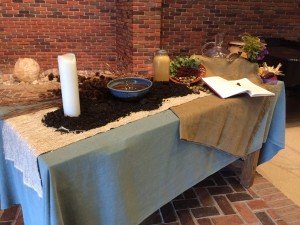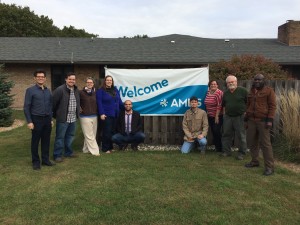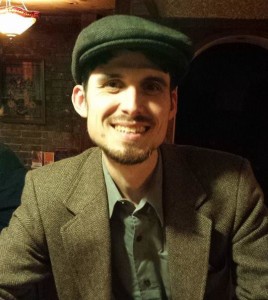Are human beings given free dominion of the land, or does God care what we do with the creation? Participants explored these and other profound questions at the Rooted and Ground conference held at Anabaptist Mennonite Biblical Seminary in Elkhart, Indiana. Six students, from Bethany Seminary and Earlham School of Religion, and two Bethany professors attended the creation care conference from Thursday, October 1 through Saturday, October 3rd.
Around 140 participants brought a range of ecumenical perspectives to address a variety of environmental concerns. Activities at the three-day conference included presentations, worship services, and immersion experiences. From the assorted presentations and conversations, participants envisioned a variety of Christian responses to the ecological crisis.
The bulk of conference events centered on a multitude of presentations. Several papers and workshops focused on biblical, theological, and ethical principles in relation to creation care and social justice. Nate Inglis, Assistant Professor of Theological Studies at Bethany Seminary, presented “Conversion to the Community of Creation: Bridging Anabaptist Theological Anthropology and Ecology” on Thursday afternoon. Scott Holland, Professor of Theology & Culture at Bethany Seminary, and Bethany MA student Kristy Shellenberger presented a workshop about theopoetics and creation care on Friday morning.
Presentations also featured practical suggestions that care for the land and local communities. Farmers described their methods of organic production. At the urban level, pastors shared how gardens were employed in liturgical practices and served the food needs of marginalized communities. “As demographics continue to shift in this country, it is important that the Church adapt and be equipped to minister in these new realities,” remarks Shayne Petty. He continues, “It is crucial that we expand the conversation about eco-theology to include the voices of those, demographically, not typically associated with agriculture. It can be incredibly empowering for persons of color, most of whom, especially Blacks, living in urban areas to be given theological language to reflect upon the beauty of God’s creation in the city.”
Worship services employed rich liturgical themes of creation’s praise to God through hymns and responsive readings. Three keynote speakers presented thought-provoking messages for conference attendees. 
Wilma Bailey, Professor Emerita of Hebrew and Aramaic studies at Christian Theological Seminary, spoke at the Thursday night worship service. She explored various Hebrew terms found in the creation accounts of Genesis 1-3. Bailey also reflected on the wildness of creation. Lions and other predators caution us humans that we are not as fully in control of nature as we like to assert.
Our Friday night speaker provided even more profound reflection. Sylvia Keesmat, an organic farmer and adjunct professor at Toronto School of Theology, interpreted from the Letter to the Romans, particularly between chapters 1, 8, and 12. She claimed that the apostle Paul expressed profound grief over the Roman imperial occupation – an occupation that degraded both social and ecological health – and explored how that grief still pervades in our present global crisis. “It was humbling,” notes Katie Cummings, “to lament together our shortcomings and to confess our idolatry.” Keesmat also professed an inspiring hope, following Paul’s message, that God’s love for all creation will prevail and includes faithful acts of earth care.
Ched Myers, biblical scholar and activist theologian, spoke as keynote for Saturday morning worship. He explained the principles of “watershed discipleship,” a recent model of Christian community formed by natural bio-regions and local economies. It recognizes the sacredness of the land in providing not only for human needs, but also for all processes that God created to sustain life.
Before the conference began, participants selected between options for immersion experiences scheduled on Friday afternoon. Four Bethany Seminary participants, myself included, went on the “Trail of Death” tour near Plymouth, Indiana. A Potawatomi tribe once inhabited two sites around the Twin Lakes area until they were expelled in September 1838 by military force. For the next three months, the tribe marched west under oppressive conditions. The survivors settled in Oklahoma territory in November. As we walked between sites, I took time to reflect on the plight of the Potawatomi tribe and what true reconciliation with American Indian communities would look like. We then made a brief tour of the Indian exhibit at the Fulton County museum and headed back to AMBS.
The Rooted & Grounded conference reminds us that the whole creation knows God as Creator and is eagerly waiting for God’s people to return to this understanding. Oscar Lugusa Malande, a student at the Earlham School Religion, states this insight well: “At this conference, it occurred to me that the revelation of children of God is being fulfilled. [For a long time] the creation has been groaning for this revelation.” Compelled by this humbling truth, Christians must allow God’s priorities to inform our role in becoming responsible stewards for the health of the land, of our communi ties, and of other living creatures.
ties, and of other living creatures.
For more background information about activities and speakers, go to the Rooted and Grounded conference website: https://www.ambs.edu/news-events/Rooted-and-Grounded.cfm
 Jonathan Stauffer is a member of the Polo (IL) Church of the Brethren congregation. He is currently a student at Bethany Theological Seminary and beginning his second year in the Master of Arts program with a concentration in theological studies.
Jonathan Stauffer is a member of the Polo (IL) Church of the Brethren congregation. He is currently a student at Bethany Theological Seminary and beginning his second year in the Master of Arts program with a concentration in theological studies.

